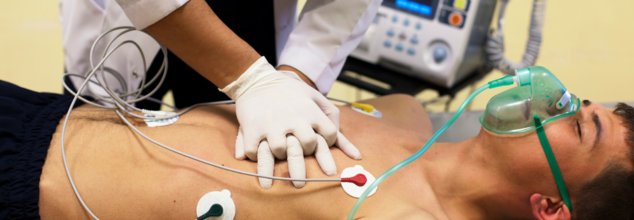- Health Conditions A-Z
- Health & Wellness
- Nutrition
- Fitness
- Health News
- Ayurveda
- Videos
- Medicine A-Z
- Parenting
- Web Stories

(L) Mission Hospital (R) Narendra Vikramaditya Yadav (Source: X)
The Man Who Posed As UK Doctor In India And Took Lives
A person who had been impersonating a medical healthcare professional has finally been arrested by the Indian police. The man is Narendra Vikramaditya Yadav. He is accused of posing as a British-trained cardiologist and allegedly performing surgeries that led to the deaths of seven of his patients. The 53-year-old used an alias of Dr N John Camm, had been working at a Mission Hospital in Damoh, Madhya Pradesh.
Who is Narendra Yadav?
He had been practising as a doctor for nearly two decades under different aliases. As per the police, he claimed to have trained under Prof John Camm, who is a respected cardiologist at the UK's St George's Hospital. He added the professor's name to his own to gain credibility. He also claimed to have worked in medical institutions across the UK, US, Germany, and Spain.
However, investigators found out that Yadav's medical degrees were forged. The police have also verified the documents and found that they lacked details like a unique registration number, which is issued to medical graduates.
How Was The Fake Doctor Caught?
The issue first came to light in February 2025, when the Damoh Child Welfare Committee flagged several patient deaths to district officials. A deeper probe revealed that Yadav had performed 64 procedures, including 45 angioplasties, during his short tenure at the hospital. Seven patients died following surgeries conducted by him.
“We got suspicious about his expertise and checked his credentials online. We found that he had cases registered against him in at least three states,” said Deepak Tiwari, head of the Child Welfare Committee.
Following the initial probe, Yadav abruptly quit his job and went missing. He was eventually arrested on Monday evening in Prayagraj, Uttar Pradesh.
The "Doctor" Has A Past
While Yadav has denied the allegations, hours before his arrest, he sent a legal notice worth Rs 5 crore, which is around $ 580,000, to several people and publications that allegedly defamed him. However, this is not the first time that he is being questioned about his identity.
In 2019, a fact-checking website flagged an X account he had created under the name of Prof N John Camm. The posts went viral until the real doctor clarified that he was being impersonated.
Further investigation revealed that Yadav had registered four companies in the UK in 2018 under the name Dr Narendra Vikramaditya Yadav, later changing it to Dr Narendra John Camm.
In 2019, he was arrested in Hyderabad for allegedly abducting a British doctor he had invited to work with him. He was also banned by India's Medical Council in 2014 for five years due to "professional misconduct," according to parliamentary records. Additionally, he was charged with fraud and cheating in Uttar Pradesh in 2013, although the case was stayed by a local court.
What Did The Hospital Say?
The hospital where Yadav had briefly worked has denied knowing about his alleged fake credentials. The staff told a media outlet that nobody had suspected him of being a fake doctor because he acted like a "big-time" professor.

(Credit-Canva)
Research Reveals The Surprising Number Of Lifestyle Choices That Put Our Heart Health At Risk
Living a healthy lifestyle is crucial for your heart health. We all have heard this from our doctors, peers, as well as multiple studies across the internet. The number of things that could have a negative impact on your heart keeps seemingly increasing, leaving many of us wondering how many more things we should be aware of. New research has painted a clear picture for us and gives the exact number of everyday risks that could slash the risk of heart attack by 63%. In the study published in the Canadian Journal of Cardiology, researchers were surprised to find that removing 56 unfavorable profiles, could lower the chances of declining heart health.
This shows that what we do every day has a really big impact on our heart health and our chances of this happening.
The researchers compared the people who had a sudden cardiac arrest with those who stayed healthy. They looked at 125 different things that people can change, like what they eat, how much they exercise, if they smoke or drink, how they feel emotionally, and even things like their job and money situation. The place you live at can also be a factor as the study noted that things like air pollution, traffic proximity and intensity, the percentage of natural environment can also affect your heart health. This helped them figure out which of these things were most strongly linked to having a sudden cardiac arrest.
Preventable Variables To Look Out For
The study found 56 things in our daily lives, our surroundings, and our health that can lead to sudden cardiac arrest. If we pay attention to these things and make them better, like eating healthier or being more active, we might be able to stop up to 63% of these heart problems from happening. It's about looking at all the pieces of our lives.
The researchers expressed their astonishment over how many cases we could possibly prevent. He said that if people who have unhealthy habits or situations made improvements, we could see a big drop, somewhere between 40% and 63%, in the number of sudden cardiac arrests. This shows that making positive changes can have a much bigger effect than we might think.
How Did The Researchers Find This?
To learn more about what causes these heart problems, the researchers looked at a lot of information from a long-term health study in the UK. This study followed over 500,000 people for many years. During that time, more than 3,000 of them had a sudden cardiac arrest. By looking at all this data, the researchers could start to see patterns and find the things that might be increasing the risk.
The research draws attention towards the increasing numbers of people suffering with heart diseases in the world. According to the American Heart Association in just one year 436,000 American died due to cardiac arrests. Cardiovascular diseases are the leading cause of death globally, taking 17.9 million lives each year. Hence, changing a few necessary things to protect your heart could save your life in the long run.

(Credit-Canva)
Undiagnosed Depression In Fathers Affects Children's Mental Health
Fathers are always portrayed as the strong ones who keep the family together. Many are not given the space to express their emotions in a healthy way. The idea that dads need to be strong and stoic affects many men in different ways. The surprising state of men’s mental health is evident in different statistics. According to World Health Organization (WHO), men commit suicide twice the rate more than women. About 80% of suicides reported in the US happen to be men. The Centers for Disease Control and Prevention (CDC) explains that men are four times more likely to die by suicide.
Not only is the lack of mental health care affecting men all around the world, but new study shows, their depression may have an effect on their children’s well-being. In a recent report done by the American Journal of Preventive Medicine, researchers found that children, whose fathers have undiagnosed depression, are more likely to have behavioral issues.
What Kinds Of Behaviors Did These Kids Exhibit?
The study found that young kids whose dads were found to be depressed, undiagnosed, were more likely to be restless and act out as they got older. By the time they were nine, they showed more anger and defiance. They also had a harder time working with others and didn't feel as good about themselves. This suggests that a father's early mental health can shape a child's behavior for many years.
Experts point out that we usually focus on mothers' mental health, especially after having a baby. However, this study reminds us of that fathers' mental health is just as important. We need to think about both parents' well-being because they both play a big role in raising their children. Ignoring one parent's struggles isn't good for the family as a whole.
How Common Is Parental Depression?
It might surprise you to learn that many fathers go through periods of feeling depressed when their kids are young. In fact, around 8 to 13 out of every 100 fathers in the US experience this. If the mother is also struggling with depression after giving birth, the chances of the father feeling depressed can shoot up, affecting as many as half of them.
To understand how fathers' mental health affects kids, researchers looked at information from a long-term study. They followed over 1,400 children born in big cities across the US. When the kids were five, they asked the fathers about any signs of depression. Then, when the kids were nine, their teachers helped assess how they were behaving in school and with others. This helped the researchers see connections over time.
Parent’s Mental Health Affect The Child’s Behavior
The results of the study clearly showed that there was a connection between fathers who were depressed and children who had more behavioral problems. The researchers found a pattern suggesting that when fathers struggle with their mental health, it can have a direct impact on how their children act and feel as they grow older.
When a father is depressed, it can make it harder for him to be the kind of parent he wants to be. For example, he might find it difficult to give his children the emotional support they need, like listening to their problems or offering comfort. His own sadness can also create tension and arguments at home, making the environment stressful for everyone in the family, including the kids.
When parents show their children that it's okay to ask for help when they're struggling, it teaches a valuable lesson. It shows kids that everyone faces challenges and that reaching out is a sign of strength, not weakness. This understanding can stay with children throughout their lives, making them more likely to seek support when they need it too.

Credits: Canva
5 Common Gynaecological Conditions You Should Know About
Women’s reproductive health is a vital part of overall well-being, but it often doesn’t get the attention it deserves. Conversations around it are still considered taboo in many communities. Because of this silence, many women continue to suffer through discomfort, pain, and long-term health issues without proper help. Some of these problems, if ignored, can affect fertility or even become life-threatening.
Here’s a look at five common gynaecological issues that affect women and why it's important to address them early.
Menstrual Problems
Many women experience some discomfort during their periods, but when the pain is severe, it could be a sign of dysmenorrhea. This condition causes intense cramping in the lower abdomen or back, often disrupting daily life. It happens due to strong uterine contractions that reduce blood flow and oxygen to the tissues.
Another issue is menorrhagia, or unusually heavy periods. This can lead to fatigue and anaemia if not managed. Then there are irregular periods, which may signal hormonal imbalances or conditions like Polycystic Ovary Syndrome (PCOS).
Ignoring menstrual irregularities may lead to bigger health problems later, including fertility issues.
Vaginal Infections and Discomfort
Many women experience vaginal infections at some point. These can result from bacterial, fungal, or yeast overgrowth. A condition called vaginitis often presents with itching, burning, unusual discharge, or changes in odour.
Although treatable, recurring infections should not be ignored, as they may point to an underlying health concern. Regular hygiene and medical attention can help prevent complications.
Ovarian Cysts and PCOS
Ovarian cysts are fluid-filled sacs that can develop on the ovaries. While most are harmless and go away on their own, some can cause pain or discomfort and may need medical attention.
Polycystic Ovary Syndrome (PCOS) is a more serious condition that causes multiple small cysts on the ovaries. It’s linked with hormonal imbalances that can lead to irregular periods, acne, hair growth, weight gain, mood changes, and difficulties in getting pregnant. Managing PCOS often involves lifestyle changes and medication.
Endometriosis and Fibroids
Endometriosis occurs when tissue similar to the uterine lining grows outside the uterus. It can cause painful periods, heavy bleeding, pain during sex, digestive problems, and infertility. Treatment may include hormone therapy, pain relief, or surgery, depending on severity.
Fibroids are non-cancerous growths inside or around the uterus. They may cause heavy periods, pelvic pressure, or frequent urination. While some fibroids don’t need treatment, others may require medication or surgical removal.
Urinary Tract Issues
Urinary Tract Infections (UTIs) are common in women and can cause a burning sensation during urination, lower abdominal pain, and the need to urinate frequently. Prompt treatment with antibiotics is usually effective.
Urinary incontinence, or the loss of bladder control, may happen after childbirth or during menopause. It’s often treatable with pelvic floor exercises, medication, or surgery.
Why It Matters
Bringing these issues into open conversation helps women take charge of their health. Early detection and treatment can make a big difference—preventing long-term complications and improving quality of life.
© 2024 Bennett, Coleman & Company Limited

